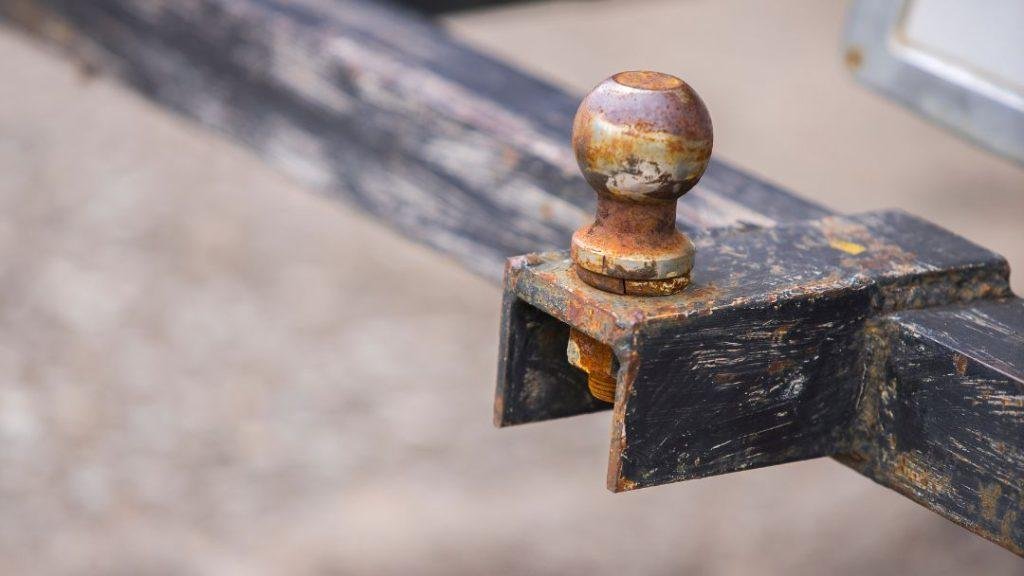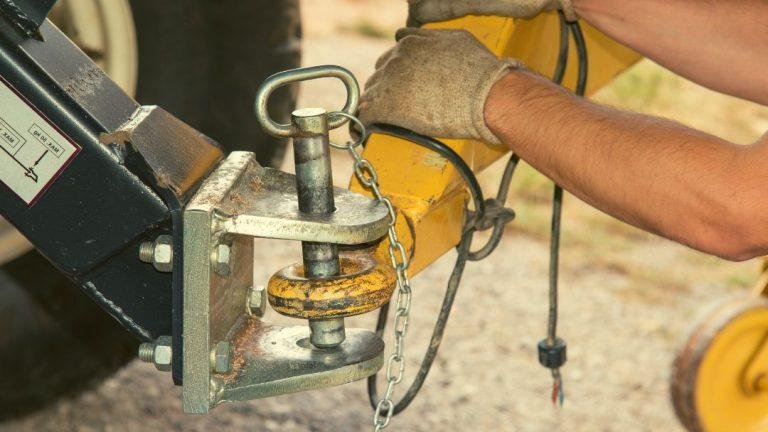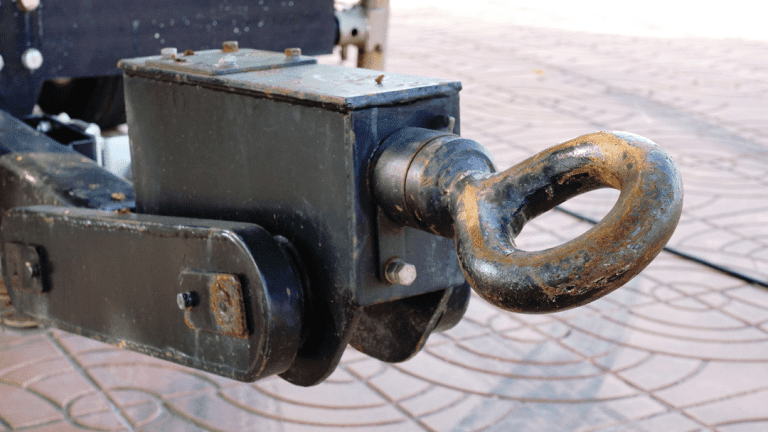Hitch covers are a popular accessory for pickup truck and SUV owners. These covers are designed to protect the hitch receiver from dirt, debris, and other environmental factors. They not only keep the hitch receiver clean but also add a touch of style to the vehicle.
The purpose of a hitch cover is to provide a protective barrier between the hitch receiver and whatever it comes into contact with, including rain, snow, dust, and mud. However, there is a question that often arises among truck owners: do hitch covers cause rust?
It’s an important question because rust can damage not only the appearance of the hitch cover but also its integrity over time. In this article, we will explore whether using a hitch cover causes rust formation on the receiver.
We will examine different materials used in making these covers and how each material reacts to rust formation. We will also discuss factors that contribute to rust formation on metal surfaces like exposure to moisture and salt.
Purpose of Hitch Covers
The primary purpose of using a hitch cover is to protect your vehicle’s trailer hitch from elements such as dust, debris, or mud that can accumulate in it over time. Additionally, they add an aesthetic appeal to your vehicle by making it look more attractive and personalized.
Hitch covers come in different designs ranging from plain black rubber ones to custom-made ones decorated with symbols or patterns that reflect one’s personality. Since these accessories are easily installed on most standard hitches’ sizes via their snug fit or locking mechanism; they have become increasingly popular among truck owners who want something more than just another boring black panel covering up their trailer hitches.

Do Hitch Covers Cause Rust?
One concern that many truck owners have about using hitch covers is whether or not they contribute to rust formation on their vehicles’ trailer hitches. If you’re worried about this issue too then you’re not alone.
The truth is, a hitch cover can cause rust formation, but it depends on various factors. Factors that contribute to rust formation on a hitch cover include exposure to moisture and salt.
Also, the type of metal used in making the hitch determines how susceptible it is to rusting. If you leave your vehicle exposed to harsh weather conditions or near the sea/ocean where saltwater can corrode metal surfaces over time, then using a hitch cover might cause more harm than protection.
What are Hitch Covers?
Hitch covers are accessories that cover the receiver hitch on a vehicle. The receiver hitch is the opening located at the rear of a vehicle where a trailer or other hitch-mounted equipment can be attached.
The primary function of a hitch cover is to protect the receiver hitch from damage and debris such as dirt, rocks, and road salt. A hitch cover also adds a decorative touch to the back of a vehicle and can be customized with graphics or logos.
The Function of Hitch Covers
Hitch covers serve several important functions beyond just protecting the receiver hitch. One of their most important functions is to keep debris out of the receiver hole when it’s not in use.
Dirt, mud, and other debris can accumulate inside the hole over time, which can make it difficult to attach or remove a trailer. Some types of hitch covers also come with built-in locks that prevent theft or tampering with your inserted accessories.
Another important role played by hitch covers is that they provide an opportunity for you to express your personality through various designs and graphics available in them. They are available in different colors, materials, shapes, sizes, and designs that cater to different styles.
Types of Hitch Covers Available
Hitch covers come in various types based on their design and function. Some common types include plastic covers which are less expensive than metal ones; aluminum covers which provide good corrosion protection; steel covers which are heavy-duty but susceptible to rusting if not maintained properly; rubberized plastic or silicone covers which offer flexibility while still protecting against dirt and debris while being gentle on paint finishes.
Another type is illuminated covers featuring LED lights that illuminate when you step on brakes making them more stylish yet functional during low-light conditions such as night driving or foggy weather conditions making them more visible compared to other types without illumination features. Additionally, there are custom-made ones designed for a specific vehicle make and model, these add a personal touch to your vehicle that shows that you care about the details of your ride.
Rust Formation on Hitch Covers
Iron Oxidation Process
Rust is a type of corrosion that occurs when iron reacts with oxygen in the presence of water or moisture. The chemical reaction that causes rust is known as the oxidation process.
When metal surfaces are exposed to moisture, such as rain or snow, a layer of iron oxide (rust) begins to form on the surface. Over time, this layer can become thicker and more widespread, eventually leading to structural damage.
Factors That Contribute to Rust Formation on Hitch Covers
Several factors contribute to rust formation on hitch covers. Exposure to moisture and salt are two primary factors that can cause rust to form on metal surfaces. For example, if you frequently drive in areas where there is a lot of salt on the roads during winter months, your hitch cover may be more susceptible to rust formation due to increased exposure.
Another factor that contributes to rust formation is environmental conditions. If you live in an area with high humidity or near the coast where the saltwater spray can reach your vehicle’s hitch cover, this can also increase the likelihood of rust forming.
In addition, any scratches or dents on the surface of your hitch cover can create a pathway for moisture and salt to reach the underlying metal, accelerating rust formation. Overall, it’s important to be aware of these factors and take steps toward regular maintenance and preventative measures if you want your hitch cover (and other metal surfaces) to remain free from rust for longer periods of time.
Hitch Cover Materials
Exploring Different Materials
Hitch covers can be made from a variety of materials including plastic, aluminum, and steel. Plastic hitch covers are popular because they are lightweight and resistant to rust. They come in many different colors, designs, and styles which makes them very customizable.
Aluminum hitch covers are also lightweight and resistant to rust formation. They have the added benefit of being strong enough to withstand heavy loads.
Steel hitch covers are much stronger than plastic or aluminum but they are also much heavier. Steel is prone to rust formation but there are treatments that can be applied to prevent this.
The choice of material for a hitch cover should depend on how it will be used. For example, if the cover will be exposed to harsh weather conditions, then a plastic or aluminum cover may not be the best option since it can crack or become damaged in extreme temperatures.
How Each Material Reacts to Rust Formation
Plastic hitch covers do not rust at all since they do not contain any metal components. Therefore, they require very little maintenance. Aluminum hitch covers also do not rust easily due to their natural resistance to oxidation and corrosion.
However, over time, aluminum can develop a film of aluminum oxide on its surface which can make it more prone to rusting in certain conditions. Steel hitch covers are more prone to rusting than other materials due to their iron content which reacts with moisture and oxygen resulting in oxidation (rust).
However, manufacturers have developed coatings that prevent rust formation on steel surfaces such as powder coating or galvanizing. Plastic and aluminum hitch covers offer better resistance against rust formation compared to steel counterparts but each material has its own advantages depending on usage requirements such as strength needs or design preferences.
Factors That Affect Rust Formation
How Environmental Factors Affect Rust Formation on a Hitch Cover
Environmental factors play a significant role in the formation of rust on hitch covers. One of the primary factors is climate.
Areas with high humidity levels or frequent rain are more susceptible to rust formation because water is one of the essential components for rust formation. Additionally, areas near the coast are more prone to rust formation due to saltwater exposure.
Saltwater exacerbates corrosion and speeds up the oxidation process, eventually leading to rust formation. Location is another factor that can contribute to rust formation.
If your vehicle is parked outside constantly, it will be exposed to various weather elements such as rain, moisture, and snow, contributing to the likelihood of hitch cover rusting. Furthermore, if you often drive on bumpy roads or gravel surfaces that cause dust and debris buildup on your hitch cover surface, this can also lead to corrosion over time.
How Regular Maintenance Can Prevent Rust from Forming
Regular maintenance of your hitch cover can help prevent rust from forming and prolong its lifespan significantly. Cleaning your hitch cover regularly is an essential preventive measure against corrosion.
You should clean it using mild soap and water regularly; doing this helps remove dust particles and other debris that might have accumulated on its surface over time. Another preventive measure you can take is applying protective coatings such as paint or wax onto your hitch cover’s surface after cleaning it thoroughly; this will create a protective barrier between your hitch cover’s surface and environmental factors causing oxidation.
Furthermore, inspecting your hitch covers for signs of damage periodically will help prevent minor issues from becoming major problems that may lead to corrosion over time. Environmental factors such as climate and location significantly impact the likelihood of rust forming on a hitch cover; however, regular maintenance practices such as cleaning and applying protective coatings can help prevent it.
The Impact of Hitch Covers on Rust Formation
Analyze whether or not using a hitch cover contributes to rust formation
One of the biggest questions regarding hitch covers is whether or not they contribute to rust formation. Some people believe that using a hitch cover actually traps moisture and causes rust to form more quickly. However, others argue that using a hitch cover can actually help prevent rust by shielding the metal from environmental factors such as rain, snow, and road salt.
To answer this question, we can look at studies that have been conducted on the topic. One study performed by the Society of Automotive Engineers found that using a plastic hitch cover did not contribute to rust formation on the tow hitch.
However, when a metal cover was used instead, there was an increase in corrosion. Another study performed by Consumer Reports found similar results.
They tested different types of tow hitches with and without plastic covers and found that those with covers had less visible corrosion than those without. These studies suggest that using a plastic hitch cover may be beneficial in preventing rust formation.
Present evidence from studies or personal experience
Of course, personal experience can also play a role in determining whether or not using a hitch cover contributes to rust formation. Some people may have had positive experiences with using a particular type of cover while others may have seen increased corrosion.
One factor to consider is the material of the hitch and its susceptibility to rusting. If you have an older car with an older tow hitch made out of steel, it may be more prone to rusting even with proper maintenance and the use of a plastic cover.
Ultimately, it is difficult to say definitively whether or not using a hitch cover contributes to rust formation since there are many variables involved such as material type and environmental conditions. However, based on research and personal experiences, it seems likely that using a plastic hitch cover can help prevent rust formation.
How to Prevent Rust Formation on Hitch Covers
Clean Your Hitch Cover Regularly
One of the most important things you can do to prevent rust formation on a hitch cover is to keep it clean. Dirt and debris can trap moisture against the metal surface, leading to corrosion over time.
To clean your hitch cover, use a mild soap and water solution along with a soft-bristled brush or cloth. Avoid using abrasive materials that could scratch the surface of the cover, as this could also lead to rust formation.
Apply Protective Coatings
Another way to prevent rust from forming on your hitch cover is by applying protective coatings. There are several products available specifically for this purpose, including clear spray-on coatings and waxes.
These coatings create a barrier between the metal surface and the elements, preventing moisture from getting in and causing corrosion. Before applying any protective coating, be sure to thoroughly clean and dry your hitch cover first.
Choose Corrosion-Resistant Materials
Choosing a hitch cover made from corrosion-resistant materials can also help prevent rust formation. Stainless steel is one such material known for its resistance to corrosion even in harsh environments. Other options include plastic or aluminum covers which do not corrode at all but offer minimal protection for purely aesthetic purposes.
Store Your Hitch Cover Properly
How you store your hitch cover when it’s not in use can also affect its lifespan. Keep it out of damp or humid areas where moisture can accumulate, as this can lead to rust formation even if you’ve taken steps to protect it otherwise. By keeping these tips in mind and taking proactive measures with your hitch covers when necessary will ensure that they remain looking their best while protecting them against all types of environmental factors that contribute towards rust formation over time.
Conclusion
Hitch covers are an essential accessory for any vehicle with a tow hitch. They serve to protect the hitch from debris and weather elements, which can cause rust formation.
Rust formation on metal surfaces such as steel, aluminum, and even plastic is inevitable given the right environmental conditions such as humidity and exposure to saltwater. Although some may argue that the use of hitch covers accelerates rust formation on a hitch ball, it is evident that this is not necessarily true.
The material used for the cover plays a significant role in how prone it is to rusting. Hitch covers made of plastic are less likely to promote rust formation compared to steel or aluminum.
To prevent rust formation on your hitch cover, regular maintenance such as cleaning and waxing will go a long way. Additionally, applying protective coatings specially formulated for metals will provide an extra layer of protection against environmental factors that contribute to corrosion.
While it is true that using a hitch cover does not guarantee zero-rust formation on your vehicle’s tow-hitch ball, regular maintenance can significantly reduce its occurrence. Investing in high-quality materials such as plastic or purchasing protective coatings designed for metal surfaces will prolong their lifespan and ensure optimal functionality in all weather conditions.




